Greenflation” or price hikes in renewable technology resources such as metals, minerals, and others is becoming a concern due to surging energy prices and the government's finalized plan to drastically cut greenhouse gas emissions.
According to industry sources, South Korea "has plenty of reasons to be nervous" about soaring utility costs.
On Monday, the US West Texas Intermediate (WTI) Crude Futures reached a seven-year high of $83.73 per barrel while Brent Crude oil hit a three-year high price of $86.04 per barrel.
With China struggling with its energy supply and other key economies rebounding from the pandemic facing higher energy demand, the shortages of natural gas and coal are in full view.
South Korea’s new goal of cutting greenhouse gas emissions has increased by 40 percent by 2030 from 2018 levels.
The new goal would require manufacturing businesses to drastically overhaul their facilities coal and liquefied natural gas account for 60 percent of their energy supply.
It costs 276 won per kilowatt-hour to generate electricity from a 20-gigawatt floating offshore wind farm to be built by South Korea by 2034--five times more than the cost of generating electricity through nuclear power plants, which the Moon government seeks to phase out.
Consequently, the Federation of Korean Industries (FKI) has been against the government's plan.
They argued that the government is "not being sufficiently cautious" in its green campaign implementation and "not considerate" about the difficulties faced by enterprises in the carbon neutrality transition.
Incheon National University professor Son Yang-hoon said that greenflation’s effects would possibly be "felt across every corner of society, including households."
Son added that greenflation may be passed on to future generations if not properly addressed.



 Indian Refiners Scale Back Russian Oil Imports as U.S.-India Trade Deal Advances
Indian Refiners Scale Back Russian Oil Imports as U.S.-India Trade Deal Advances  How America courted increasingly destructive wildfires − and what that means for protecting homes today
How America courted increasingly destructive wildfires − and what that means for protecting homes today  Asian Markets Surge as Japan Election, Fed Rate Cut Bets, and Tech Rally Lift Global Sentiment
Asian Markets Surge as Japan Election, Fed Rate Cut Bets, and Tech Rally Lift Global Sentiment  Lee Seung-heon Signals Caution on Rate Hikes, Supports Higher Property Taxes to Cool Korea’s Housing Market
Lee Seung-heon Signals Caution on Rate Hikes, Supports Higher Property Taxes to Cool Korea’s Housing Market  Australian Household Spending Dips in December as RBA Tightens Policy
Australian Household Spending Dips in December as RBA Tightens Policy  Trump’s Inflation Claims Clash With Voters’ Cost-of-Living Reality
Trump’s Inflation Claims Clash With Voters’ Cost-of-Living Reality  Thousands of satellites are due to burn up in the atmosphere every year – damaging the ozone layer and changing the climate
Thousands of satellites are due to burn up in the atmosphere every year – damaging the ozone layer and changing the climate  How is Antarctica melting, exactly? Crucial details are beginning to come into focus
How is Antarctica melting, exactly? Crucial details are beginning to come into focus  Australian Pension Funds Boost Currency Hedging as Aussie Dollar Strengthens
Australian Pension Funds Boost Currency Hedging as Aussie Dollar Strengthens  Ukraine minerals deal: the idea that natural resource extraction can build peace has been around for decades
Ukraine minerals deal: the idea that natural resource extraction can build peace has been around for decades  As the Black Summer megafires neared, people rallied to save wildlife and domestic animals. But it came at a real cost
As the Black Summer megafires neared, people rallied to save wildlife and domestic animals. But it came at a real cost  Gold and Silver Prices Rebound After Volatile Week Triggered by Fed Nomination
Gold and Silver Prices Rebound After Volatile Week Triggered by Fed Nomination  China Extends Gold Buying Streak as Reserves Surge Despite Volatile Prices
China Extends Gold Buying Streak as Reserves Surge Despite Volatile Prices  Trump Lifts 25% Tariff on Indian Goods in Strategic U.S.–India Trade and Energy Deal
Trump Lifts 25% Tariff on Indian Goods in Strategic U.S.–India Trade and Energy Deal  U.S.-India Trade Framework Signals Major Shift in Tariffs, Energy, and Supply Chains
U.S.-India Trade Framework Signals Major Shift in Tariffs, Energy, and Supply Chains 































